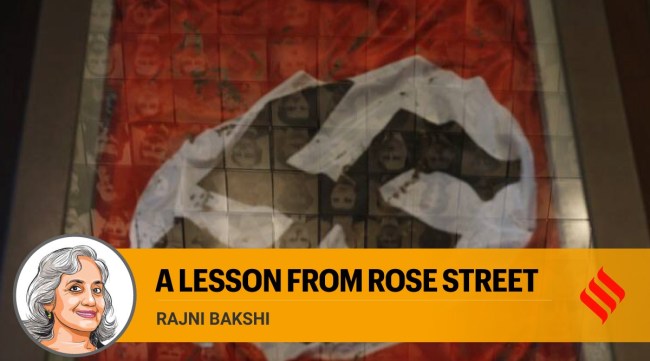Opinion Lesson From Rose Street: A non-violent protest that made the Nazis blink
Rosenstrasse reminds us of the value of every single tiny act of refusal to participate in a division of society into ‘us’ and ‘them’
 February 27 to March 6, this year, marked the 80th anniversary of the most successful non-violent protest in Nazi Germany. (Express Photo)
February 27 to March 6, this year, marked the 80th anniversary of the most successful non-violent protest in Nazi Germany. (Express Photo) It is commonly, and wrongly, believed that nonviolence was bound to fail in the Nazi regime.
February 27 to March 6, this year, marked the 80th anniversary of the most successful non-violent protest in Nazi Germany. The Rosenstrasse Protest of 1943, in the heart of Berlin, resonates in our times because both the horror and valour keep taking new forms.
The protestors were “gentile”, or not-Jew, women married to Jewish men. On February 27, 1943, the Gestapo rounded up over 2,000 Jewish men who were still free because they were in mixed marriages. A few weeks earlier Joseph Goebbels, the Reich Minister of Propaganda, had resolved to make Berlin “entirely free of Jews”.
What Goebbels did not anticipate was that the spouses of the arrested men would offer such determined resistance. Nazi ideology and propaganda held these gentile women in contempt for marrying, and staying married to, Jews. For almost a decade, such women had been pressured to divorce their Jewish spouses. Some women were also put through stressful interrogation by the Gestapo.
As the historian Nathan Stoltzfus, author of Resistance of the Heart: Intermarriage and the Rosenstrasse Protest in Nazi Germany, has pointed out, these women had already been extraordinarily courageous — by refusing to divorce or abandon their Jewish spouses. In many cases, this also meant that they suffered the agony of being ostracised by members of their own extended families.
Ironically, it was Goebbels’ mass arrests that forged an active solidarity among the wives of those arrested. To begin with, the women came to Rosenstrasse (Rose Street), where the arrested men were being held, just to seek information about their own husbands. As their numbers grew so did their determination, which gave rise to the cry: “Give us our husbands back.”
What stopped the Gestapo from gunning them down? The Nazis were not indifferent to public opinion among those they saw as their following — non-Jewish Germans. Firing on unarmed “Aryan” women seeking the return of their husbands was difficult even for a Goebbels.
According to Stoltzfus, it was also significant that at that juncture, the losses of the German army on the Eastern front were already putting a dent in the image of the Third Reich. So, managing public opinion was a tricky challenge for Goebbels at that time.
However, the women who stood their ground at Rosenstrasse could not have counted on any of this. They risked being fired at because for them it was a “this far and no more” moment — they were not going to be pushed around any more.
Decades later, interviews by historians with Goebbels’s junior officer have confirmed that Goebbels decided to release the imprisoned men because it was the easiest way to get rid of the street protests.
Rosenstrasse is not quite the same as other famous nonviolent street-level protests that defeat a brutal, authoritarian regime. After all, the success of the Rosenstrasse protests also starkly highlighted that chilling question, asked ad nauseum: Why didn’t non-Jews rise en masse to defy and prevent the deportation and incarceration of their Jewish fellow Germans? This was primarily because masses of Germans, either out of real conviction or abject fear, could not see the Jewish people as “fellow citizens”.
Rosenstrasse matters 80 years later because across time and radically different societies this drama is akin to the ringing of alarm bells.
Rosenstrasse represents a call to conscience for those who think they are safe because they are part of an “us” who are favoured by the regime in power. Whenever a “them”, some other, is set aside as an outsider, such “outsiders” can only be ill-treated by the ruler if enough beneficiaries of said regime go along, remain quiet.
Those “gentile” German women may not have appeared on the world stage before that week in 1943 but their long-standing refusal to abandon their Jewish husbands was a form of active defiance. They may have seemed silent in public, but to the regime, their resistance was loud and clear and this made a difference.
Rosenstrasse reminds us of the value of every single tiny act of refusal to participate in a division of society into “us” and “them”. This remains true even in moments of despair when we feel the lack of a collective resistance that is effective.
The protests at Rosenstrasse did not alter the fate of Jews as a whole. But it did make an all-powerful regime blink. Remembering that can help us to be more creative in how we affirm and protect unconditional dignity for all. It all begins by refusing to be pushed into any identity, any “us”, that is pitched against any “them”.
The writer is an author and founder of the online platform Ahimsa Conversations






